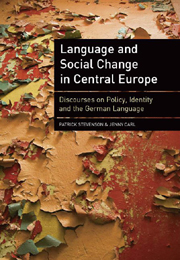Book contents
- Frontmatter
- Contents
- Acknowledgements
- List of Tables
- Transcription Conventions
- Map of Central Europe
- 1 Introduction
- 2 Discourses on Language in Social Life: Theoretical and Methodological Orientations
- 3 Sociolinguistic Histories and the Footprint of German in Eastern Central Europe
- 4 Language Policy Discourses: Interventions and Intersections
- 5 Language (Auto)biographies: Narrating Multilingual Selves
- 6 Language Ideologies: Negotiating Linguistic Identities
- 7 Conclusions
- Appendix A European Institutions and Documents Concerning Language Policy
- Appendix B Preamble to the European Charter for Regional or Minority Languages
- Appendix C Introduction to the 2005 Commission Communication ‘A New Framework Strategy for Multilingualism’
- Appendix D Introduction to the 2008 Commission Communication ‘Multilingualism: an asset for Europe and a shared commitment’
- Appendix E German and Austrian agents and institutions in foreign cultural policy
- Appendix F Extract from ‘Auswärtige Kulturpolitik – Konzeption 2000’
- Appendix G Central focus – ‘Leitbild’ – of the Goethe-Institut
- Appendix H Austria's Auslandskulturkonzept NEU
- Appendix I Plattform Kultur Mitteleuropa – Platform Culture Central Europe
- Appendix J Extract from Austria kulturint – Tätigkeitsbericht 2002
- Appendix K Czech 2001 White Paper on Education
- Appendix L Czech 2004 Education Act
- Appendix M Extract from Czech Follow-up of Action Plan on Language Learning and Linguistic Diversity
- Appendix N Hungarian 1997 Directive Concerning the Education for National and Ethnic Minorities
- Appendix O Extract from 2007 Hungarian National Core Curriculum
- Appendix P Extract from Hungarian Follow-up of Action Plan for Language Learning and Linguistic Diversity
- References
- Index
5 - Language (Auto)biographies: Narrating Multilingual Selves
Published online by Cambridge University Press: 05 February 2013
- Frontmatter
- Contents
- Acknowledgements
- List of Tables
- Transcription Conventions
- Map of Central Europe
- 1 Introduction
- 2 Discourses on Language in Social Life: Theoretical and Methodological Orientations
- 3 Sociolinguistic Histories and the Footprint of German in Eastern Central Europe
- 4 Language Policy Discourses: Interventions and Intersections
- 5 Language (Auto)biographies: Narrating Multilingual Selves
- 6 Language Ideologies: Negotiating Linguistic Identities
- 7 Conclusions
- Appendix A European Institutions and Documents Concerning Language Policy
- Appendix B Preamble to the European Charter for Regional or Minority Languages
- Appendix C Introduction to the 2005 Commission Communication ‘A New Framework Strategy for Multilingualism’
- Appendix D Introduction to the 2008 Commission Communication ‘Multilingualism: an asset for Europe and a shared commitment’
- Appendix E German and Austrian agents and institutions in foreign cultural policy
- Appendix F Extract from ‘Auswärtige Kulturpolitik – Konzeption 2000’
- Appendix G Central focus – ‘Leitbild’ – of the Goethe-Institut
- Appendix H Austria's Auslandskulturkonzept NEU
- Appendix I Plattform Kultur Mitteleuropa – Platform Culture Central Europe
- Appendix J Extract from Austria kulturint – Tätigkeitsbericht 2002
- Appendix K Czech 2001 White Paper on Education
- Appendix L Czech 2004 Education Act
- Appendix M Extract from Czech Follow-up of Action Plan on Language Learning and Linguistic Diversity
- Appendix N Hungarian 1997 Directive Concerning the Education for National and Ethnic Minorities
- Appendix O Extract from 2007 Hungarian National Core Curriculum
- Appendix P Extract from Hungarian Follow-up of Action Plan for Language Learning and Linguistic Diversity
- References
- Index
Summary
Introduction
In this chapter, we navigate away from the ‘big picture’ of policy discourses and towards the more intimate domain of individual experience. Both here and in the following chapter we shall draw on the same corpus of personal interviews but in rather different ways and for different purposes. The language biographies that constitute part of these interviews represent a particular kind of discourse on language in social life. In Chapter 6, we will try to show how such interviews provide a source of data on ways in which individuals select from a range of social and linguistic categories made available by wider discourses on the social world they inhabit in order to position themselves in relation to others, to represent themselves as social beings. Before we can do that, we need first to look closely at ways in which these individuals, as narrators, make experiences with language an organising or structural element in their life stories: what is it about ‘my’ encounters with German and other languages – their evaluations, the times and places associated with their use, their possibilities and limitations or constraints – that have made my ‘life’ what it is or has become? In this chapter, therefore, the focus is on the creation of a sense of ‘self’, and the narrative is the data (Bamberg et al. 2007: 1–8).
Our concern here, then, is with what we referred to in Chapter 2 as the transformation of (often fragmented) experience into stories with their own structural logic and shape.
- Type
- Chapter
- Information
- Language and Social Change in Central EuropeDiscourses on Policy, Identity and the German Language, pp. 127 - 160Publisher: Edinburgh University PressPrint publication year: 2010

